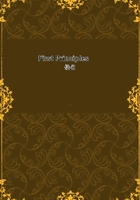
第5章
And as in that nescience which must ever remain the antithesis to science,there is a sphere for the exercise of this sentiment, we find a third generalfact of like implication. We may be sure, therefore, that religions, eventhough no one of them be actually true, are yet all adumbrations of a truth. §5. As, to the religious, it will seem absurd to set forth any justificationfor Religion, so, to the scientific, it will seem absurd to defend Science.
Yet to do the last is certainly as needful as to do the first. If there existsome who, in contempt for its follies and disgust at its corruptions, havecontracted towards Religion a repugnance which makes them overlook the fundamentaltruth contained in it; so, there are others offended to such a degree bythe destructive criticisms men of science make on the religious tenets theyhold essential, that they have acquired a strong prejudice against Scienceat large. they are not prepared with any reasons for their dislike. theyhave simply a remembrance of the rude shakes which Science has given to manyof their cherished convictions, and a suspicion that it may eventually uprootall they regard as sacred; and hence it produces in them an inarticulatedread.
What is Science? To see the absurdity of the prejudice against it, weneed only remark that Science is simply a higher development of common knowledge;and that if Science is repudiated, all knowledge must be repudiated alongwith it. The extremest bigot will not suspect any harm in the observationthat the Sun rises earlier and sets later in summer than in winter. but willrather consider such an observation as a useful aid in fulfilling the dutiesof life. Well, Astronomy is an organized body of kindred observations, madewith greater nicety, extended to a larger number of objects, and so analyzedas to disclose the real arrangements of the heavens and to dispel our falseconceptions of them. That iron will rust in water, that wood will burn, thatlong kept viands become putrid, the most timid sectarian will teach withoutalarm, as things useful to be known. But these are chemical truths: Chemistryis a systematized collection of such facts, ascertained with precision, andso classified and generalized as to enable us to say with certainty, concerningeach simple or compound substance, what change will occur in it under givenconditions. And thus is it with all the sciences. They severally germinateout of the experiences of daily life. insensibly as they grow they draw inremoter, more numerous, and more complex experiences; and among these, theyascertain laws of dependence like those which make up our knowledge of themost familiar objects. Nowhere is it possible to draw a line and say -- hereScience begins. And as it is the function of common observation to servefor the guidance of conduct; so, too, is the guidance of conduct the officeof the most recondite and abstract results of Science. Through the countlessindustrial processes and the various modes of locomotion it has given tous, Physics regulates more completely our social life than does his acquaintancewith the properties of surrounding bodies regulate the life of the savage.
All Science is prevision; and all prevision ultimately helps us in greateror less degree to achieve the good and avoid the bad. Thus being one in originand function, the simplest forms of cognition and the most complex must bedealt with alike. We are bound in consistency to receive the widest knowledgeour faculties can reach, or to reject along with it that narrow knowledgepossessed by all.
To ask the question which more immediately concerns our argument -- whetherScience is substantially true? -- is much like asking whether the Sun giveslight. And it is because they are conscious how undeniably valid are mostof its propositions, that the theological party regard Science with so muchsecret alarm. They know that during the five thousand years of its growth,some of its larger divisions -- mathematics, physics, astronomy -- have beensubject to the rigorous criticism of successive generations, and have notwithstandingbecome ever more firmly established. They know that, unlike many of theirown doctrines, which were once universally received but have age by age beenmore widely doubted, the doctrines of Science, at first confined to a fewscattered inquirers, have been slowly growing into general acceptance, andare now in great part admitted as beyond dispute. They know that scientificmen throughout the world subject one another's results to searching examination;and that error is mercilessly exposed and rejected as soon as discovered.
And, finally they know that still more conclusive evidence is furnished bythe daily verification of scientific predictions, and by the never-ceasingtriumphs of those arts which Science guides.
To regard with alienation that which has such high credentials is a folly.